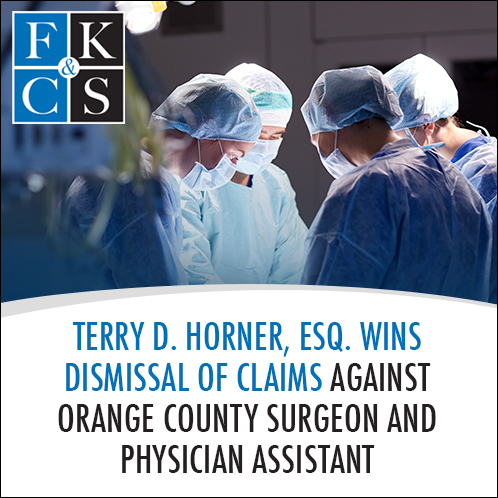 Terry D. Horner recently won a dismissal for an Orange County, NY surgeon, the physician assistant who assisted him and their group medical practice, in a case involving a 73-year-old man who presented to the emergency department (ED) of an Orange County hospital with complaints of difficulty swallowing over the previous two weeks, and inability to tolerate solid foods or liquids. The ED assessment included failure to thrive, hyponatremia and difficulty swallowing liquids. The patient’s past medical history was significant for stage II esophageal cancer involving the proximal esophagus, originally diagnosed in 2008.
Terry D. Horner recently won a dismissal for an Orange County, NY surgeon, the physician assistant who assisted him and their group medical practice, in a case involving a 73-year-old man who presented to the emergency department (ED) of an Orange County hospital with complaints of difficulty swallowing over the previous two weeks, and inability to tolerate solid foods or liquids. The ED assessment included failure to thrive, hyponatremia and difficulty swallowing liquids. The patient’s past medical history was significant for stage II esophageal cancer involving the proximal esophagus, originally diagnosed in 2008.
The patient was admitted to the hospital, and over the next 17 days was seen by numerous specialties including nephrology, pulmonology, neurology, nutrition, speech and occupational/physical therapy. His hemoglobin and hematocrit remained low throughout the admission and there was a suspicion of a gastrointestinal (GI) bleed for which he received multiple transfusions. No source of active bleeding was ever identified.
The limited involvement of Feldman, Kleidman, Collins & Sappe LLP’s (FKCS) surgeon client began with a consultation two weeks after the patient was admitted, in connection with the surgical placement of a G-tube that an interventional radiologist had been unable to accomplish. The surgeon successfully inserted the gastrostomy tube (G-tube) two days later, assisted by the physician assistant who regularly worked with the surgeon. After a post-operative follow-up the next day, the surgeon signed off the case and had no further contact with the patient.
Overnight, the patient’s condition significantly declined. A critical care specialist documented shock of uncertain etiology, acute hypoxic respiratory failure on bilevel positive airway pressure (BiPap) and discolored right toes concerning for embolic disease. The grave prognosis was discussed with the family, who adhered to the patient’s do not resuscitate (DNR) directive. The patient died the next afternoon.
The plaintiff (the patient’s estate) brought an action against all the providers who had seen the patient during the hospitalization. As to FKC&S’s clients, it was claimed that the G-tube insertion procedure was contraindicated, delayed and done negligently and without informed consent.
Just before the deadline for summary judgment motions, the plaintiff abandoned claims against the physician assistant, but expanded claims against the surgeon to include failure to coordinate care with other providers, failure to render care and treatment in the two weeks before the surgeon was first consulted and failure to test for, diagnose and/or treat multiple non-surgical conditions including congestive heart failure and pulmonary conditions.
FKC&S filed a motion for summary judgment, arguing that the G-tube surgery was not the proximate cause of the patient’s death; the surgeon was not responsible for any care or treatment before he was first consulted, nor for coordination of care, arranging consultations, or diagnosing and treating cardiac and pulmonary conditions; the claims against the physician assistant were abandoned; the G-tube procedure was performed with full consent and various procedural arguments.
In opposition to the motion, the plaintiff proffered only one expert—an internist with limited hospital experience—to oppose all the summary judgment motions, despite the multiple medical specialties involved in the case. The thrust of the plaintiff’s opposition as to FKC&S’s client distilled to two issues: that he should have classified the G-tube placement as an emergent or urgent surgical procedure, instead of treating it as an elective surgery, which purportedly allowed it to be delayed; and that he failed to “coordinate care” with other treating specialties. Significantly, the plaintiff’s expert internist conceded that the proximate cause of the patient’s death was the failure to place the G-tube the day he was admitted to the hospital, not the brief delay before its placement two weeks later. The plaintiff failed to address several other arguments FKC&S made in the motion.
Based on the arguments FKC&S made in reply, the court found the plaintiff’s expert internist unqualified to render a surgical opinion (among others) and further held that, even if the opinion were accepted, it did not sufficiently demonstrate that the conduct of FKC&S’s clients was a proximate cause of the patient’s decline and death. On these grounds, the court granted FKC&S’s motion and dismissed the complaint. The case will proceed to trial against the remaining defendants.

